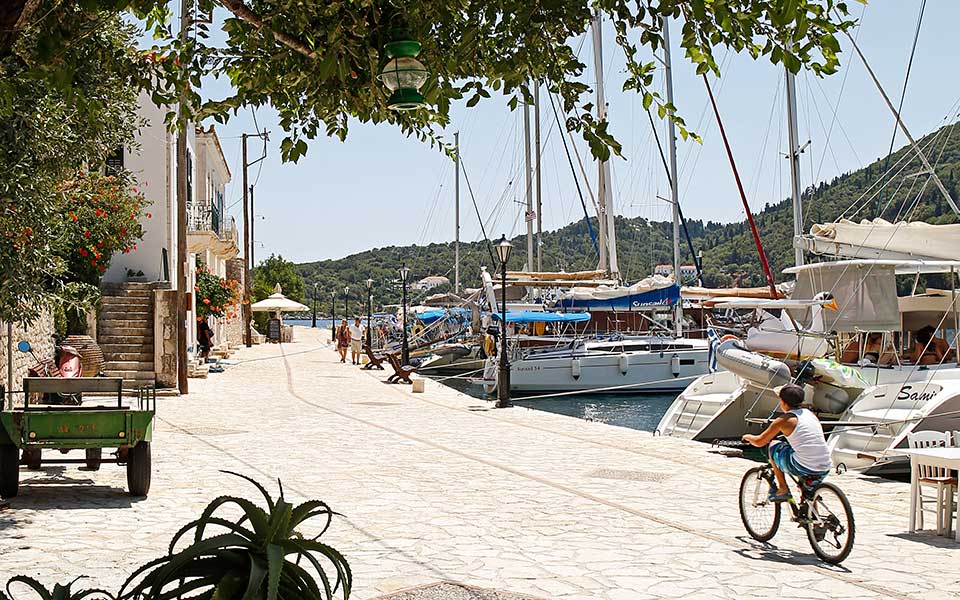Rushing isn’t something that fits with Ithaki’s style. This special island (also known as Ithaca) has managed to maintain a rhythm of life and a style of tourism completely in tune with nature.
Surrounded by the most incredible hues of turquoise – a characteristic of the Ionian Sea – this verdant isle invites you to explore it from coast to coast, to wander through its villages, to chat with its people – in short, to discover it.
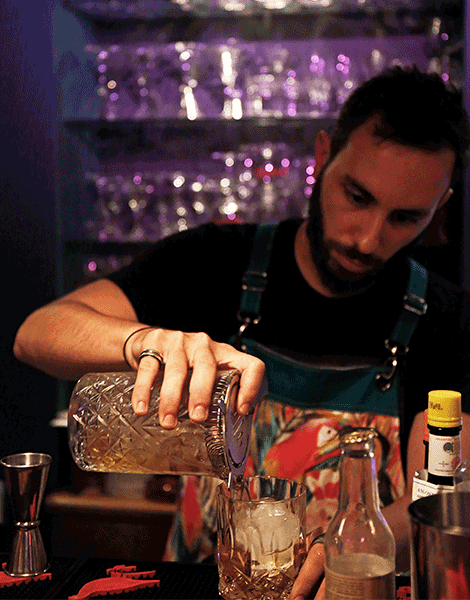
© Nikos Kokkas
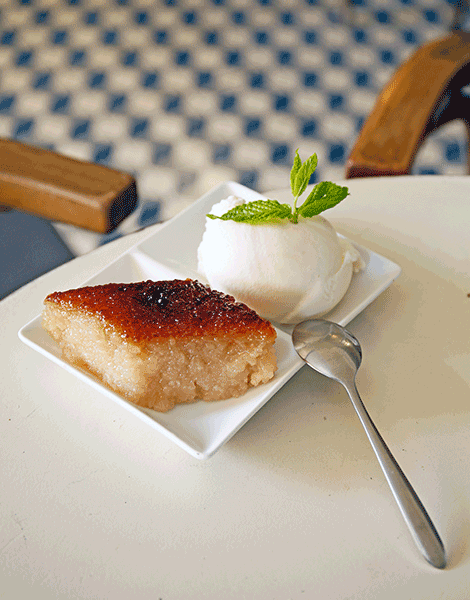
© Nikos Kokkas
HOMERIC MEMORIES
The first thing you’ll likely want to do on reaching Vathy, Ithaki’s capital, will be to just take a seat at a table by the sea and enjoy a nice meal, or a coffee and a rovani, a local dessert made with rice and honey.
Nowadays, only small vessels moor in the beautiful harbor area, while bigger ones occupy the space where the passenger ships once docked. (The main ferry port is now located at Piso Aetos, which lies some seven kilometers from Vathy).
In the capital, in the area around the town hall the houses are relatively new, having been constructed from scratch in the aftermath of the 1953 earthquake (those on the other side of town didn’t collapse back then, and have a picturesque air of times gone by). This is also the location of most of the bars, including Mylos, with its carefully prepared cocktails, music at a sensible volume and tables next to the waves. Another bar is O Rozes, found near the main square, and it stands out for its ethnic fusion music and boho character.
Around the area, street names such as Pinelopis, Tilemahou and Odyssea serve as a reminder of the close connection between Ithaki and Homer. Many locals are also named after the heroic figures immortalized by the ancient poet. The first traces of life on the island date to the Neolithic Period (4000-3000 BC), while the name Ithaki appears in Homer’s epic works as the homeland of King Odysseus.
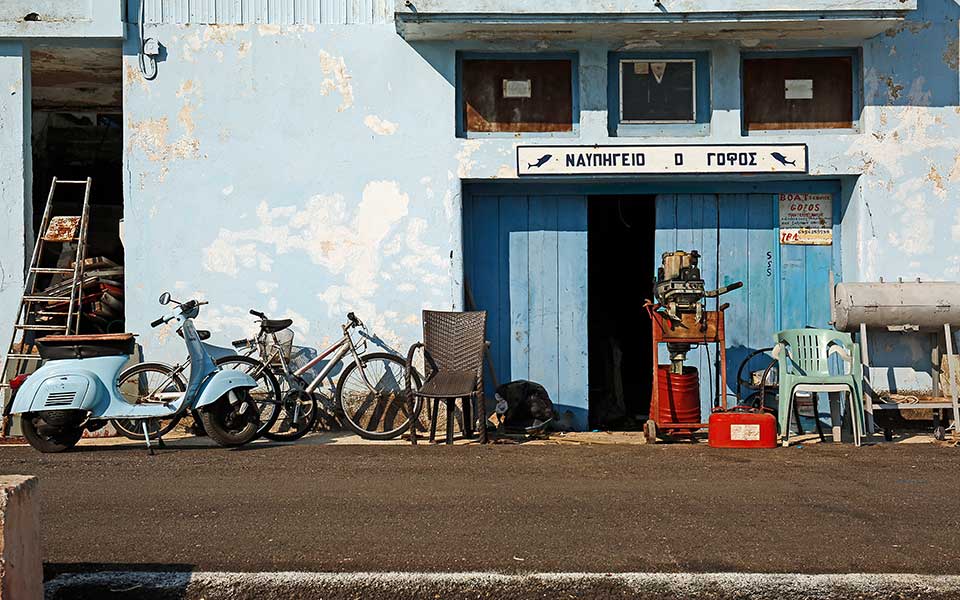
© Nikos Kokkas
It is around here we meet Spyros Arsenis, a retired musician and onetime mayor of Ithaki (1975-1995), sitting at a table by the edge of the sea. He recommends that we visit the site friendsofhomer.gr. He speaks highly of the international symposium on the “Odyssey” held every three years, at summer’s end. Over the years, the event has attracted highly-respected figures from the world of the arts and letters, such as Jacqueline de Romilly.
At Cavos, we are welcomed by shipwright Pantelis Xanthopoulos. Two or three caiques and about as many smaller fishing vessels, all creations of his, are moored in the small cove in front of O Gofos, his shipyard. Just how old is the shipyard? “It surely goes back 10 generations. It existed before 1821. There are others who do repairs, but I am the only one who builds boats as well. I also make plastic ones, but I have customers throughout the entire Ionian and beyond who buy wooden vessels.”
Scaling the verdant slope behind Vathy is Perahori, a minimally touristy village, perhaps best known for the kontosouvli (skewered chunks of pork) served up at the taverna Kaliora (tel +30 26740.336.54).
The beaches in the southern part of the island include Mnimata (or Minimata), Skinos, Filiatro (which has amenities), Sarakiniko (which this past year acquired a beach bar) and Yidaki, one of the most beautiful in the south, which is accessible only via a footpath or the boats that depart frequently from the port.
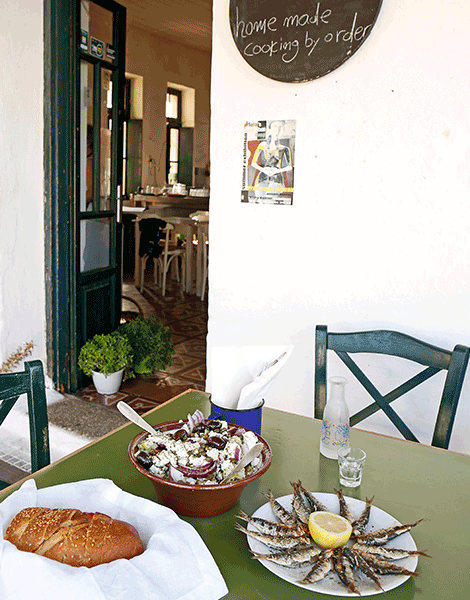
© Nikos Kokkas

© Nikos Kokkas
MOUNT NIRITO
A narrow, 620-meter-wide isthmus links together the southern and the northern sections of the island. As you ascend towards Mount Nirito and the Monastery of Katharon, various vantage points reveal panoramic vistas of the whole of southern Ithaki.
Just before the monastery, you come to Anogi, a small village with many crumbling houses, which today has a population of 37 and just one kafeneio (traditional coffee house)/taverna. The kafeneio’s name, according to the old sign above the door, is To Hani tis Anois (“The Inn of Anoi”). However, its current owner Sofia Moraiti now calls it To Kafeneio tis Anois (the kafeneio of Anoi). “It’s time to put my own mark on it,” she explains, smiling.
Besides the name change, she has already made her presence felt through the tasty dishes she prepares with much personal care, and also through the welcoming feel of the old establishment which also operates as a grocery. Local products are prominently displayed; wine, olive oil and honey still constitute the main products of the island – just as in antiquity.
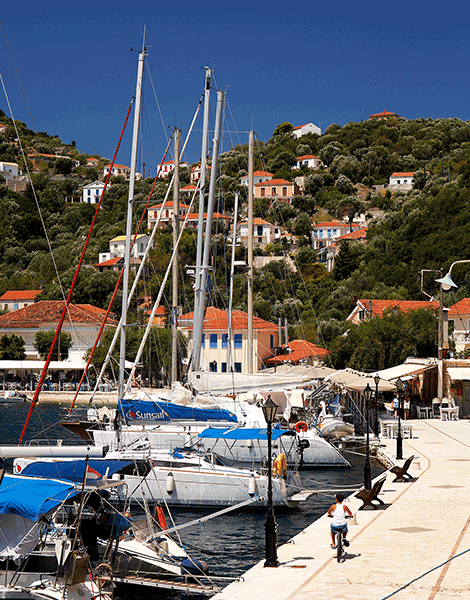
© Nikos Kokkas
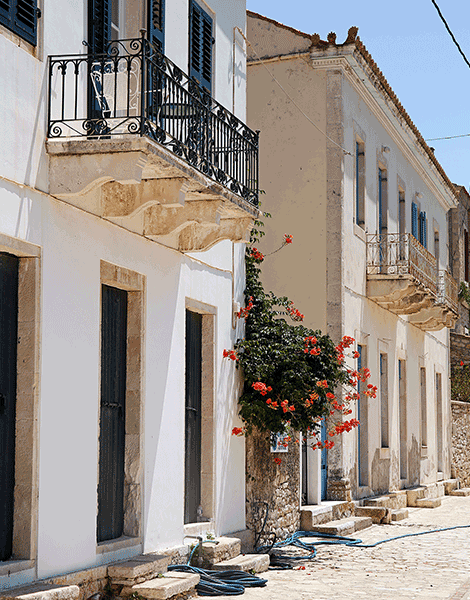
© Nikos Kokkas
Sitting at the table next to us is Nikos Koutsouvelis, the former owner of the business. He succeeds in snaring the interest of the photographer in our party on account of his expressive face and the stories he recounts from the five-year period during which he lived in Africa when he was young. His yearning for Ithaki is what brought him back to Anogi.
Next to the kafeneio is the church of the Koimisi tis Theotokou (Dormition of the Mother of God), with its Venetian bell tower on one side. It once served as the cathedral of Ithaki, when Anogi was the island’s capital. It was constructed during the Middle Ages, and initially had just a single, small door in the back to afford protection from pirates. According to Michalis Livanis, our local guide, the side entrance and windows were added later, while the abundant murals were completed during four different periods.
He shows us some small clay funnels – positioned inside the stone walls for better acoustics – as well as some rare murals, such as that of Christ in the sanctuary, and also one of Aghios Ahmet, or St Ahmed the Calligrapher, a Turk who converted to the Orthodox religion due to his love for a Russian woman.
Around the village one can see a peculiar geological phenomenon: tall, natural, menhir-like rocks distinctive enough to have their own names, like Araklis and Kavellaris. Anogi is also the starting point of the best-maintained and most popular hiking trail on Ithaki, which leads to Kioni.
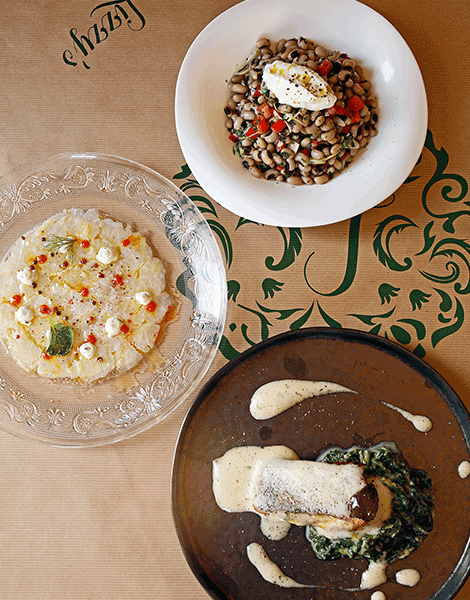
© Nikos Kokkas
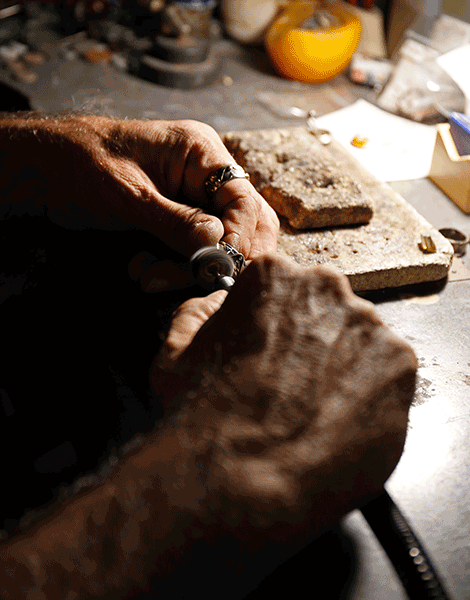
© Nikos Kokkas
FROM KIONI TO THE SCHOOL OF HOMER
Of course, the most comfortable way to reach Kioni – Ithaki’s most touristy village – is by car. Its architecture can be described as “mixed construction,” as Ithakans like to say – that is, a combination of houses that survived the earthquake and ones built afterwards. One building that stands out is that which today houses the restaurant Lizzy’s, located on the left side of the small harbor. This restored mansion dates back to 1894, when shipowner Yiannis Ventouras built it for his love, Elizabeth Hamilton, a niece of Lord Nelson. The maritime tradition of Ithaki has left other signs as well, such as the captains’ houses in various locations across the island.
Restaurants, tavernas and shops add a touristy vibe to the slow-paced atmosphere of this seaside village. At Technima, you’ll find beautiful handmade jewelry items created by its owner, Dimosthenis Ganazoulis. Sailboats and yachts regularly fill the little harbor and the surrounding coves. The nearest beach is Filiatro, which has its own snack bar and a few tables in the shade under the trees. There are actually two beaches on the island that share the same name – this one in the north, and another in the south.
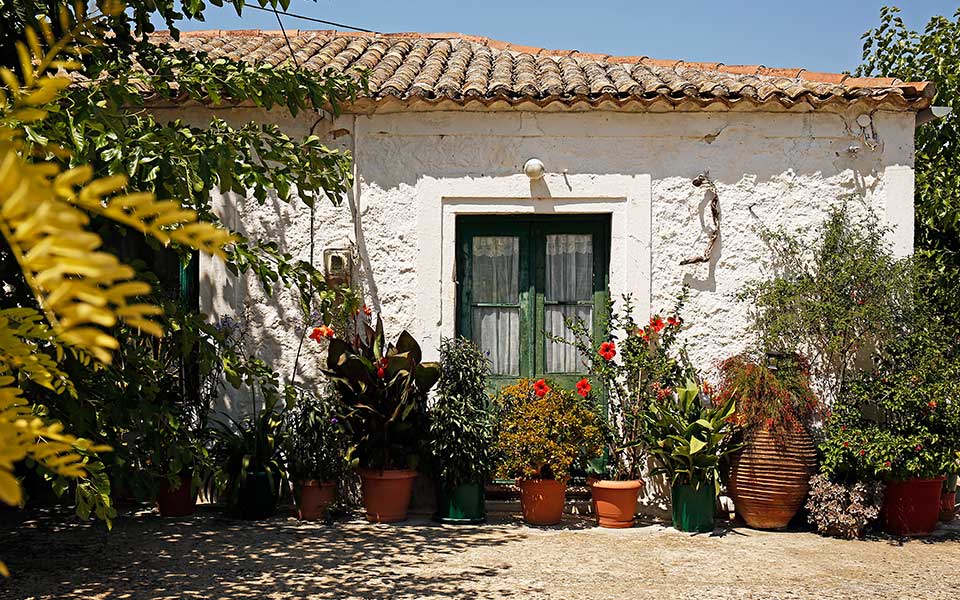
© Nikos Kokkas
Something that seems a bit striking at first is that most of the rental accommodation is managed by British companies, and that the island is filled with English “For Sale” signs. Perhaps the Brits were the first to realize Ithaki’s tourism potential and value. There are villas available to rent at a cost of several thousand euros per week, yet at the same time there are also small, secluded beaches where you might find people free camping.
The feeling that Kioni leaves you with is truly wonderful. The same goes for Frikes, a small harbor with lots of fishing vessels, which is located a bit further up. Platreithias and nearby Stavros, the only village left standing after the earthquake, are both well worth a stop.
It is just outside the latter village that the trail begins for the School of Homer, an important archaeological site. There, among other sights, you will see the ruins of a Hellenistic tower, on top of which the little church of Aghios Athanasios was erected. The trail retains an almost archetypal charm, as does the archaeological site itself, unguarded though the latter is in need of signage.
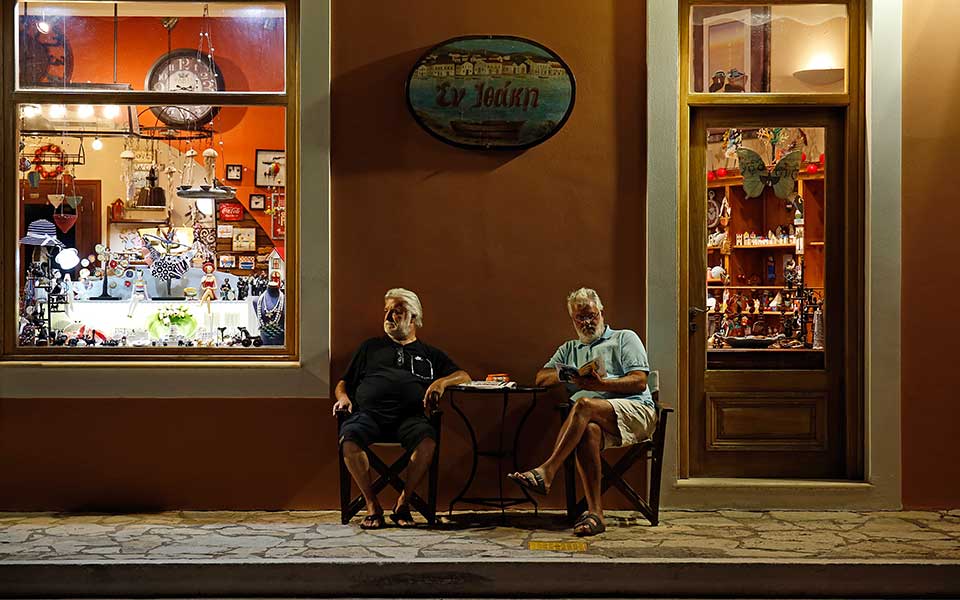
© Nikos Kokkas
Judging by today’s tourism standards, it is clear that Ithaki does have some deficiencies. For example, no buses service its beaches, nor does any marina offer water and electricity, despite the large number of charter vessels that visit the island. It does, however, retain a feeling of moderation, something that is on the verge of disappearing on many islands where tourism has developed further.
Above all, the island has managed to preserve its romance, the kind described by the poet Cavafy in his famous lines:
“Keep Ithaka always in your mind.
Arriving there is what you’re destined for.
But don’t hurry the journey at all.
Better if it lasts for years,
so you’re old by the time you reach the island,
wealthy with all you’ve gained on the way,
not expecting Ithaka to make you rich.
Ithaka gave you the marvelous journey.
Without her you wouldn’t have set out.
She has nothing left to give you now.
And if you find her poor, Ithaka won’t have fooled you.
Wise as you will have become, so full of experience,
you’ll have understood by then what these Ithakas mean.”
From “Ithaka” by C. P. Cavafy
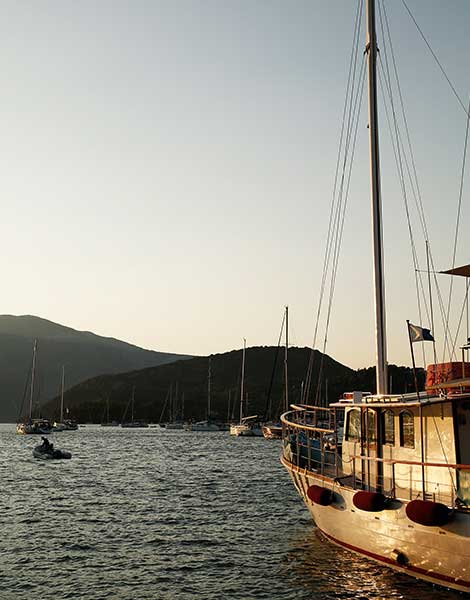
© Nikos Kokkas
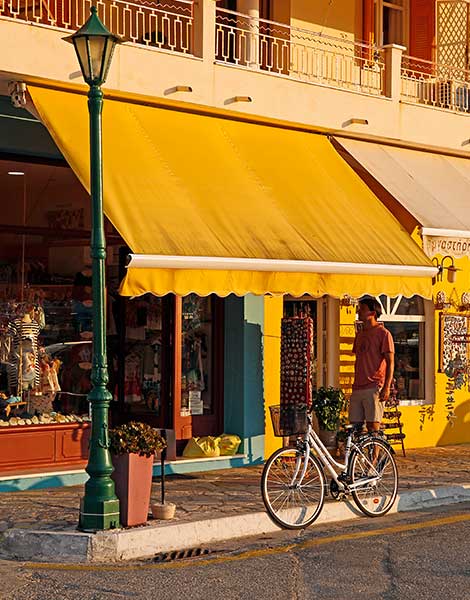
© Nikos Kokkas
EXOGI AND “EXOGIINOS”
At the end of last July, Exogi, a small settlement in the north of Ithaki with a great view, acquired a kafeneio once again after 3 decades without. Called Exogiinos, (a pun on the village’s name meaning “extraterrestrial”) it is housed in a renovated stone building with a wonderful courtyard, and features a well-stocked wine cellar and music that transforms it into a pleasant hangout every evening.
Along with the new kafeneio, there has also been an increase in the permanent population of the village; since November 2018, the three residents of Exogi (one retired Greek and a German couple) have been joined by Panagiotis Varnakiotis, the owner of Exogiinos.
“It’s awesome. Peaceful and nice, far away from Athens,” he says, as the lyrics to a song “…heaven, I am in heaven,” flow through the speakers. In conversations in Exogi, you’ll often hear Greek interspersed with English, especially in summertime, when those who have immigrated – mainly to the US – return “home.” Houses open their shutters again and the village comes to life.
Our journey to Ithaki wraps up with a refreshing dip at Afales Beach, which features a bit of the ruggedness typical of the beaches exposed to the northerly winds. Two large tree trunks resting upon the pebbles also help lend the scene a sense of wildness, making one half expect to see a raft to wash up on the shore, straight out of one of Homer’s epics.

